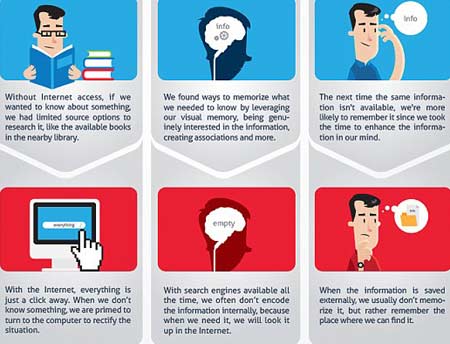|
 We don't recall memories?like we used to. Above is how this change took place. |
|
The Internet is becoming our main source of memory instead of our own brains, a study has concluded. In the age of Google, our minds are adapting so that we are experts at knowing where to find information even though we don’t recall what it is. The researchers found that when we want to know something we use the Internet as an ‘external memory’ just as computers use an external hard drive. Nowadays we are so reliant on our smart phones and laptops that we go into ‘withdrawal when we can’t find out something immediately’. And such is our dependence that having our Internet connection severed is growing ‘more and more like losing a friend’. Researchers from Harvard University, the University of Wisconsin-Madison and Columbia University in the US carried out four tests to check their theory. They involved giving test participants a trivia quiz and then seeing whether they recognised computer-related words more quickly than other words. The other tests involved seeing if people remembered 40 pieces information they would typically later have normally looked up. The third and fourth parts of the study involved checking how well people remember where to look up information on-line and whether or not they remembered the location more than the actual data. The results showed that when people don’t believe they will need information for a later test, they do not recall it at the same rate as when they do believe they will need it. In fact, some of those in the study ‘actively did not make the effort to remember when they thought they could later look up the trivia statements they had read’, the paper says. The other results showed that when continuous Internet access is expected, people are better at remembering where they can find it than the details. (Agencies) |
一項研究得出結論稱,網絡正取代人腦成為記憶的主要存儲庫。 我們的大腦正逐漸適應谷歌時代,就算我們記不起某一信息,我們卻善于從網絡中找出這一信息。 研究人員發現,當我們想知道某一事物時,我們就會將網絡作為一種“外存”,就像電腦使用外部硬盤驅動器一樣。 如今我們是如此依賴于我們的智能手機和筆記本電腦,當我們“無法立刻找出某一信息時,我們的生活甚至會停擺”。 我們也非常依賴于網絡,如果我們的網絡連接中斷了,我們會“越來越覺得像失去了一個朋友”。 來自美國哈佛大學、威斯康星大學麥迪遜分校和哥倫比亞大學的研究人員為了驗證他們的理論,開展了四項測試。 這些測試包括讓參與者做瑣碎記憶測試,看他們是否能更快識別和電腦相關的詞匯。 其他的測試包括觀察人們是否能記住40條他們一般稍后會查閱的信息。 研究的第三和第四部分包括查看人們是否能很好地記住查閱信息的網站,以及他們是否對網站比對信息本身記得更清楚。 結果顯示,當人們認為自己在稍后的測試中不需要該信息時,他們能回憶起來的信息比認為自己稍后將需要該信息時要少。 該研究報告稱,事實上,部分參與研究的人“沒有積極努力地去記住他們所看到的信息,因為他們認為稍后可以查閱到這些瑣碎信息”。 其他研究結果顯示,當人們期待可以持續地連接到互聯網時,人們更善于記住找到信息的地方而非信息的細節。 相關閱讀 (中國日報網英語點津 陳丹妮 編輯:Julie) |
|
Vocabulary: withdrawal: 退縮;(社交場合或情緒方面的)冷漠 trivia: 瑣事 look up: 查閱,查考 |
